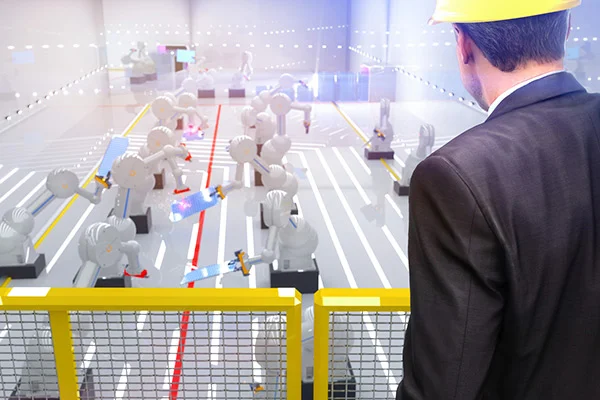Benefits of Industry 4.0
- Home
- Blog Details

- July 1 2021
- admin
In the previous article, we read about what Industry 4.0 is, its basic principles, and the prime technologies that surround it. Industry 4.0 is another name for the fourth industrial revolution to run a recap, which is a continuation of the three earlier revolutions.
Industry 4.0 is an umbrella tag that refers to immense changes sweeping across the industrial value chain system. These changes are driven by the rise of new-age technologies that offer a smoother, efficient way to organize, optimize, and manage all processes within a manufacturing factory ecosystem. It incorporates new production & communication tools to connect every aspect into a single well-oiled digital system. In addition, it adopts unique methods to streamline operations across various domains within a production cycle.
As industry 4.0 brings in uncapped changes in every sector, it also plays a significant role in the ROI factor in businesses. Since it aims to merge physical and digital systems into unified cyber-physical machinery, it has dropped considerable alterations in the way productions roll.
We have already seen how Industry 4.0 aims to mold automation, big data, AI with machines. Here in the blog, we will go through all the points highlighting the benefits of incorporating Industry 4.0 principles.
Benefits of Industry 4.0
Industry 4.0 in business processes and production lines may vary from one entity to another. It depends on which technologies are prioritized, utilized more, and how it affects the existing workforce & working processes. Without going into complications, here are the commonly observed plus points that a business benefits from Industry 4.0.

Higher Production & improved Productivity
Since Industry 4.0 results in smart factories, it assures higher, faster production with improved quality of productivity. As a result, one can allocate resources more effectively. Additionally, the production line faces less downtime because of advanced automated monitoring and error-free decision-making capability. Ultimately, it improves the general Overall Equipment Effectiveness.
One in six businesses also expects a 20% sales rise owing to Industry 4.0 application.
Optimization
A great side of Industry 4.0 is that it permits optimization. Since it involves automation, there is scope for self-optimization, leading to zero downtime of factory machines. Optimization drives better maintenance of any equipment by having the needed resources at the right location and time. The ability to harness production capacity consistently is a better option than extensive downtime or an overhaul.
Customization
Industry 4.0 requires every domain to stay interlinked, which is means intelligent factories and the Industrial Internet of Things (IIoT) must be interconnected and constantly in a loop. It provides business owners and manufacturers with the current market trends, eliminating any middle man to bridge these two entities. Such end-to-end constant connections allow for smooth scaling of production up or down depending upon market demand.
Higher Efficiency
Efficiency is a parameter that covers every aspect of a production line. As mentioned before, higher efficiency means less downtime, faster output, better finish, faster changeovers, automatic tracing, and automated report generation. In addition, higher efficiency guarantees better turnover and customizing opportunities depending on the consumer market.
Increased collaboration and knowledge share
We know how traditional manufacturing factories operate. They work in close-knit units where one unit is unlikely to come in touch with the other, thus minimizing knowledge share. It isn’t the case with Industry 4.0 laden smart factories. The cyber-physical system ensures every production line, from the factory floor to business process to sales & distribution, is well connected and updated should there be any new revelation. It surpasses location, time zone, platform constraints. Picture this; if one smart sensor pulls in unique insight and wants to update the system about it, the automated process will make sure it does without any human intervention.
Agility and Flexibility
A significant benefit of Industry 4.0 is that it enables easy scaling of production based on requirements. Thus, one can introduce new products based on market demand, increase or decrease output and make new opportunities.
Ease of Compliance
Since industry compliance is a great necessity for any business, particularly consumable items such as pharmaceuticals and food products, automating the complaint process goes a long way than a manual process.
Industry 4.0 makes it possible to automate compliance actions, thereby easing the load off human employees.
Quality Customer Service
Industry 4.0 also presents ample chances to improve the customer experience. For example, an automated supply chain will highlight the products and their availability in the supply chain without having the human workforce keep a tab in such a painstaking task.
Automated report generation helps giving sales reports, market analysis, and customer feedback for the business owner to reassess his resources and business strategies. Automated tracking and tracing help keep an eye on the journey chain of any product. The best part is IoT. Business owners can create AI chatbots to address customer grievances & queries without any human involvement. All these automated operations generate data and information which can be analyzed, manipulated further for production & process enhancement.
Cost Reduction
Setting up a smart factory laden with Industry 4.0 tech is not child’s play. “Rome was not built in a day,” and so is a smart factory. Moreover, it requires a considerable investment which is the upfront costs.
That being said, the returns of such investment are wholesome if done correctly. Moreover, since implementing Industry 4.0 involves laying down system integration, automation, big data management, intelligent surveillance, and AI, all these technologies play a huge role later on in terms of cost savings. Reason being:
- Better allocation and resource management
- Smoother, faster manufacturing
- Less assembly line downtime
- Less time consumption
- Less quality and compliance issues
- Less product, material waste
- Less human involvement means fewer costs involving recruitment & training
- Decreased operating costs
Any business owner will agree on the perks of Industry 4.0 in terms of the cost factor.
Increased Innovation
Industry 4.0 provides excellent scope for innovation. Whether it is manufacturing production line, supply distribution chain, or business domains, the 4.0 techs present a good amount of knowledge that can be harnessed to improve product quality or bring up a new product itself.
Higher revenues and profits
A business owner’s prime goal is to reap maximum profits with minimum expenditure involved. Industry 4.0 provides the chance to reap those benefits. One great advantage is the reduced staffing solutions which results in much lower staffing costs. In addition, automation never gets tired, rarely errs, and can give productivity 24/7, which is a big positive over human employees. All these amounts to higher revenues and profits.
Return on Investment
Industry 4.0 technologies arose from the need to outcompete rivals in the market, improving production lines and have better revenues. All the above points lead to good ROI.
According to the PwC report, digitization of products and services generated €110 billion of additional revenues in the European market. Another market research report suggests that nearly 54% of businesses with industry 4.0. implementation is deemed to witness double-digit growth in the next six years. For example, an Australian welding firm has reported a 60% increase in productivity among their employees due to automation technologies.
Of course, there are challenges inhibiting Industry 4.0 as well. An overnight decision for a makeover calls for a failure since incorporating Industry 4.0 requires planning, strategy, and investment. That being said, the pros outweigh the cons by a mile. Since this era is undergoing the fourth industrial revolution, we are yet to see more enormous changes and innovations in the tech landscape. So it is safe to say that Industry 4.0 has managed to bring hope among manufacturers and business owners as of now.
- adminhttps://www.pre-scient.com/author/webwideit/
- adminhttps://www.pre-scient.com/author/webwideit/
- adminhttps://www.pre-scient.com/author/webwideit/
- adminhttps://www.pre-scient.com/author/webwideit/

